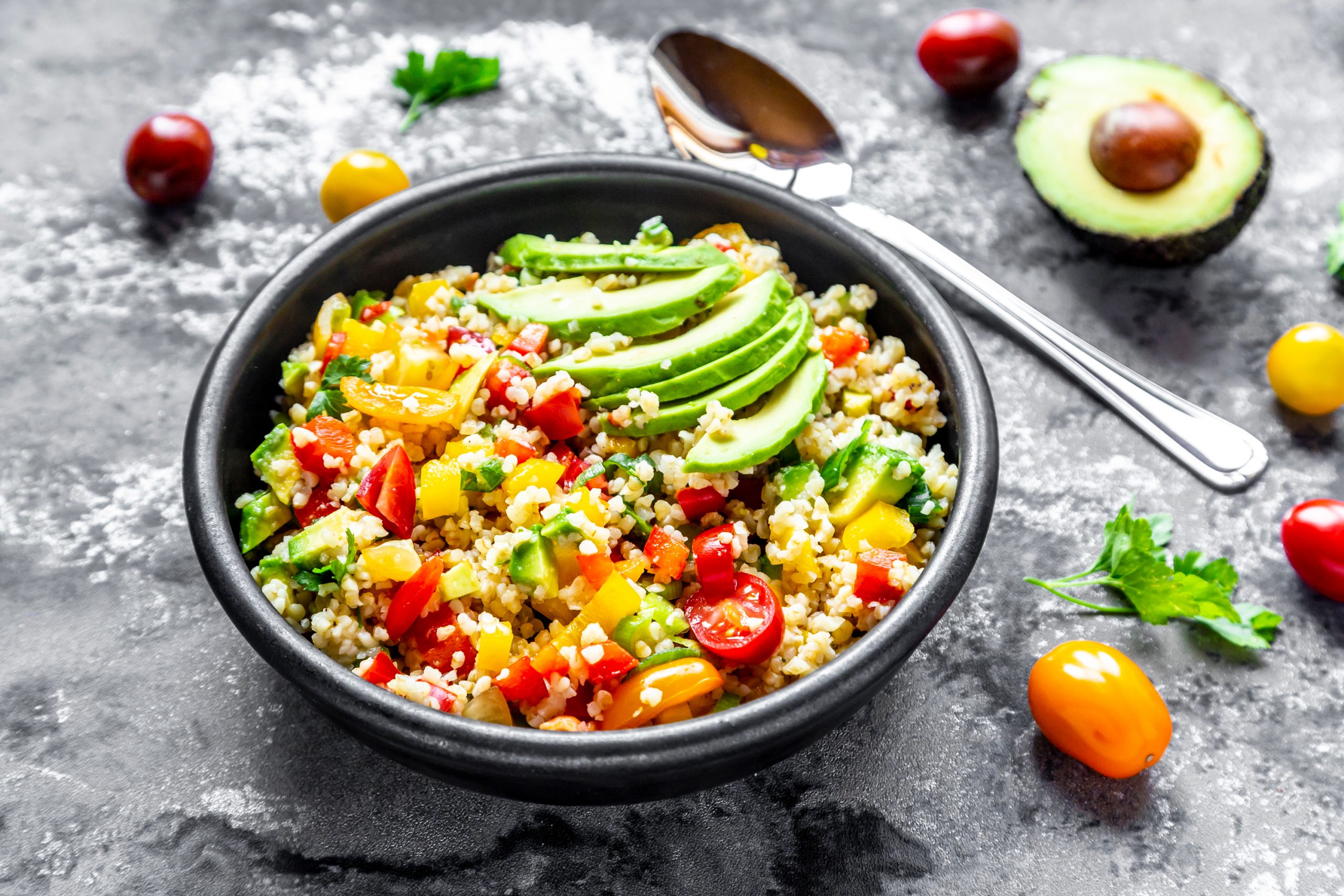Is bulgur wheat healthy? Nutrition facts and health benefits, according to experts
We asked the experts for their take on the benefits of bulgur wheat


Bulgur wheat is a healthy and hearty whole grain, similar in texture to couscous and quinoa.
Easy to prepare and low in calories, bulgur wheat is a popular staple in both Mediterranean diets and Middle Eastern dishes like Tabbouleh. It’s been seen as a healthy food swap in recipes instead of white rice and it's also a great ingredient to add to salads and soups if you're following a low-carb diet. We asked the experts for their take on the benefits of bulgur wheat. Plus, they weighed in on its important nutritional values and if bulgur wheat is as healthy as it seems.
Is bulgur wheat healthy?
Yes, bulgur wheat is healthy. It contains lots of vitamins and minerals that your body needs. The cereal grain is made from cracked wheat and is deemed a whole grain, as all three parts of the wheat kernel - germ, endosperm and bran - are eaten.
Registered dietitian Jane Clarke, supports the whole grain status of bulgur wheat: "Yes, bulgur wheat is healthy as bulgur is whole grain, made from cracked wheat," she says. "Bulgur wheat is packed full of vitamins, minerals and fibre which can all help with weight loss, improving digestion and gut health, as well as helping to reduce chronic disease risks."
Indeed, bulgur wheat’s fibre content is perfect for those seeking to eat a diet that is high in fibre. The Whole Grain Council has even noted that bulgur wheat has "more fibre than quinoa, oats, millet, buckwheat or corn."
Additional nutritional data shows that a single serving of bulgur wheat makes up 30 percent of your recommended daily fibre allowance. This is important for digestion and keeping constipation at bay.
Bulgur wheat has further health benefits in helping to balance hormones. Clinical nutritionist Suzie Sawyer, explains: "Bulgur wheat contains some antioxidants, phytonutrients and lignans which help balance hormones, is a source of protein and is low fat," she tells us. "Eating whole grain foods helps balance blood sugar levels, protects against heart disease, and keeps the digestive system running smoothly."
GoodtoKnow Newsletter
Parenting advice, hot topics, best buys and family finance tips delivered straight to your inbox.
One study confirmed that those who consume up to 225 grams of whole grains (like bulgur wheat) a day, reduce their risk of developing heart disease by 20 per cent.
How many calories are in bulgur wheat?
100 grams bulgur wheat = 342 calories
“As bulgur wheat goes, 100 grams equates to about 342 calories,” says Roxane Bakker, a registered dietitian at Vitl. “It's easy to cook and can be added to many dishes, including salads, stews and breads,” she adds.
Interestingly, bulgur wheat calories are better than quinoa, with one cup (200g) of quinoa containing nearly double the amount of bulgur wheat calories. The cereal grain also has a very low fat content. It contains only two grams of fat in a 100 gram serving. Providing you don’t cook it with any additional oils or butter, of course.
Is bulgur wheat gluten free?
Bulgur wheat is not gluten free. It should not be eaten by anyone on a gluten free diet. “As bulgur is made from cracked wheat, this means it is a wheat product,” explains dietitian Jane Clarke. “Therefore, anyone that suffers with a wheat or gluten intolerance or allergy should stay away.”
Nutritionist Suzie also warns against bulgur wheat if you have intolerances. Especially if you are a coeliac or follow a low FODMAP diet to help treat symptoms of Irritable Bowel Syndrome. “Those with serious allergies to gluten or who have been diagnosed with coeliac disease will not be able to eat it,” she tells us.
Both experts recommend gluten free diet substitutes like quinoa, corn, buckwheat and rice.
Is bulgur wheat a carb?
Yes, bulgur wheat is a carb - and a good one at that. Unlike refined carbohydrates, it isn’t stripped of its important nutrients and provides a slow-release of energy.
Nutritionist Suzie Sawyer recognises bulgur wheat as a carbohydrate providing this preferred energy source. “It’s high fibre content means that absorption is slow, therefore eating bulgur wheat is not going to provide a quick sugar-rush and then a dip in energy,” she says. “Whole wheat grains such as bulgur will keep you feeling fuller for longer and provide sustained energy.”
Dietitian Jane Clarke says that bulgur wheat is a low carb: “Bulgur wheat is one of the lowest carb whole grains you could get,” she tells us. “In 100 grams of dry bulgur wheat, there is approximately 76g of total carbohydrates. Bulgur wheat is therefore a great food to eat on a low carb diet as it is highly nutritious."
Clinical nutritionist Suzie agrees bulgur wheat is “fine for a moderately low carb plan”, though she states that the whole grain wouldn’t work on a Keto diet. As Keto places a very strict limit on carbohydrate intake, bulgur wheat would take up the majority of your daily allowance. So it’s best to stick to lower carbohydrates like green vegetables.
Bulgur wheat vs rice – which is healthier?
Our experts agree that, on the whole, bulgur wheat is healthier than rice. This is based on the cereal grain having higher quantities of nutrients than rice in certain areas.
“Bulgur wheat is higher in fibre and protein in nutritional comparison to rice,” says dietitian Roxane Bakker. “But bulgur wheat is lower in Folic acid (B9) which helps the body convert food (carbohydrates) into fuel (glucose), which is used to produce energy. However if it were a competition, bulgur wheat would have to come out on top as it’s packed with vitamins, minerals and fibre.”
Dietitian Jane Clarke agrees that bulgur wheat has a higher level of vitamins and minerals. She chose the grain over rice as it’s high fibre count is one of the best bulgur wheat benefits. “Nutrition wise, bulgur wheat is definitely healthier compared to rice, as bulgur contains twice as much fibre which is very important for a healthy digestive system and controlling blood sugar levels.”
Nutritionist Suzie Sawyer notes that bulgur wheat is especially better than white rice. Though she highlights that bulgur is slightly lower in manganese. Manganese is a mineral that helps activate enzymes in the metabolism, according to one study.
Of course those with gluten and wheat intolerances should choose rice, as bulgur wheat is not gluten-free.

Suzie Sawyer is a nutritional expert with more than 20+ years of experience. Specialising in female health and food supplements, she is a member of the British Association for Applied Nutrition and has a diploma in nutrition from the Institute for Optimum Nutrition, London. Suzie has been featured in a range of title, including Women’s Health, woman&home, Women, Women’s Own, and Daily Mail.
A health expert and Cordon Bleu chef, Jane Clarke has more than 30 years of experience in the food industry. Jane is both a dietitian and Cordon Bleu chef with more than 30 years’ experience treating patients, and working alongside doctors and consultants to provide expert support for those facing illness. Jane was the nutritional adviser on Jamie Oliver’s school meals campaign. In 2016, she founded Nourish to support those suffering with eating challenges caused by illness.

Emily Stedman is the former Features Editor for GoodTo covering all things TV, entertainment, royal, lifestyle, health and wellbeing. Boasting an encyclopaedic knowledge on all things TV, celebrity and royals, career highlights include working at HELLO! Magazine and as a royal researcher to Diana biographer Andrew Morton on his book Meghan: A Hollywood Princess. In her spare time, Emily can be found eating her way around London, swimming at her local Lido or curled up on the sofa binging the next best Netflix show.